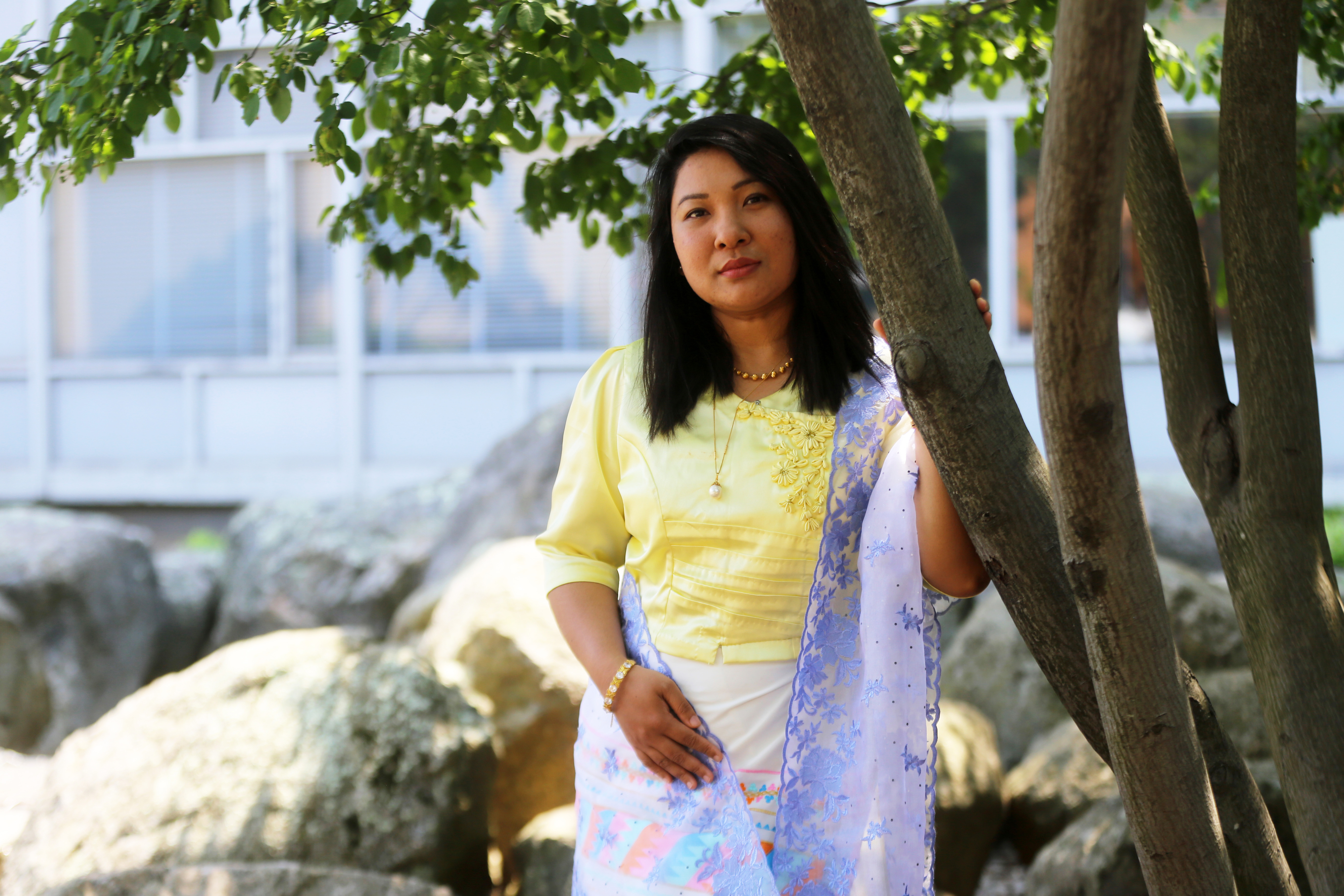
For Rani Ukhengching Marma from Bangladesh, protecting the Indigenous language also means preserving her culture, traditional knowledge, and generational wisdom.
Stephen Oakes | School of Humanities, Arts, and Social Sciences
MIT graduate student Rani Ukhengching Marma is one of nearly 200,000 Marma people who speak the endangered Marma language. The Marma are one of the largest Indigenous groups in Bangladesh, where Bengali language and culture are dominant.
For Ukheng, who is enrolled in the MIT Indigenous Languages Initiative (MITILI), preserving Marma is about more than the language itself.
“I am working to protect the language because it is strongly associated with our ancestral lands, culture, and knowledge,” Ukheng says. “Language is a big part of our Indigenous identity. If we separate out our language, we are not Marma anymore.”
MITILI is a special master’s program in the Department of Linguistics and Philosophy for members of communities whose languages are threatened. Ukheng is the first person from a Bangladeshi Indigenous group to attend an MIT master’s degree program.
“I say I come from Bangladesh, but a big portion of my identity is that of an Indigenous person,” says Ukheng. “I cannot separate those two. I am an Indigenous Marma citizen of Bangladesh.”
According to the United Nations Permanent Forum on Indigenous Issues, Indigenous peoples speak more than 4,000 of the world’s approximately 6,700 languages despite making up less than 6 percent of the global population.
Indigenous languages are under threat due to colonial practices as well as modern conflict. Languages can die from military, economic, religious, or cultural repression, and a lack of government preservation efforts.
Home conflict and obstacles
Ukheng is from an area in Bangladesh known as the Chittagong Hill Tracts. Since the 1500s, the Marma people have lived there, and in parts of India and Myanmar. The rule of British India, the Bangladesh Liberation War, and continued disputes over land and identity make the region one of frequent conflict.
In previous schooling, Ukheng says she didn’t have the opportunity to study, read, or write in her own language. The language barrier hampers access to appropriate educational resources. Many Indigenous children from the Chittagong Hill Tracts drop out of school due to numerous sociopolitical issues.
“MIT was definitely beyond my dream because of the place I come from,” Ukheng says. “Not a lot of students end up coming to the U.S. or other countries for their higher studies because we Indigenous students continuously face so many obstacles since our childhoods.”
Ukheng focused on public health while obtaining a bachelor’s degree at the Asian University for Women (AUW) in Bangladesh. She was a Fulbright scholar at St. Catherine University in Minnesota. Then she became more interested in language while attending a certificate program at the University of British Columbia.
After much determination, research, and networking, Ukheng was accepted to the MITILI. She says, “I think part of the reason they took me was my passion and what I’ve done in my community.”
Responsibility and leadership
Ukheng is the ceremonial queen (Rani) of the Marma people of the Mong Circle located in southeastern Bangladesh. Along with her husband, the Mong Circle King, Raja Saching Prue Chowdhury, they are an important authority within the community, providing resources, guidance to traditional leaders, and facilitation of government or nongovernmental programs.
Married to the king recently, Ukheng says “I realized this is a huge responsibility. People reach out because they have trust and faith in me that I can do something for them. Coming to MIT means a lot as well. It’s not just an individual achievement for myself, but they see it as a whole communal thing.”
An example of her official role involves recruiting more Indigenous students and mentoring them for higher study. Every year since 2020, AUW offers fully funded scholarships to 10 to 15 Indigenous young women from different districts of Bangladesh. AUW is coordinating the process with the Mong Circle Chief’s Office.
“Being a responsible Marma young woman, since I represent a whole community, I have the responsibility to help save the culture and save the language,” Ukheng says.
Support for the future
Her current works include helping to create an Indigenous-friendly maternal and child health care handbook in collaboration with a public health professor from the University of Toronto and working with online language platforms to incorporate Marma in their offerings.
“There are so many things to explore in language, like Marma’s distinct tonal features, which are only now being studied,” she says. “I hope in the future linguists will come and work on our language more.”
The goal of the MITILI is to provide graduates with the linguistic knowledge that will help their efforts to keep their communities’ languages alive.
After the two-year master’s program, Ukheng is planning to pursue further studies at MIT or another university in the United States. For now, she is happy to be working with linguistics professor Norvin Richards and others in the Department of Linguistics and Philosophy.
“The amount of support I’m receiving from the dean, the MIT faculty, and everyone is sometimes overwhelming because I don’t come from a culture where you get a lot of support as a woman,” she says. “Me coming to MIT has actually brought some hope of light among the Marma and other Indigenous communities so younger generations may make their way to MIT as well.”
